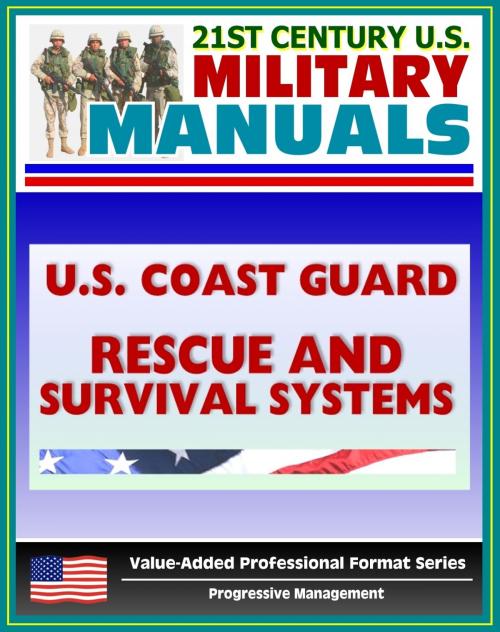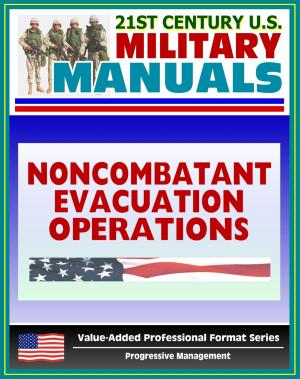21st Century U.S. Military Manuals: U.S. Coast Guard (USCG) Rescue and Survival Systems Manual - Surviving Without a Raft, Skills, Swimmer Equipment, PFDs, Vests, Clothing, Beacons, Buoys
Nonfiction, Health & Well Being, Health, First Aid, Sports, Water Sports, Boating| Author: | Progressive Management | ISBN: | 9781466010024 |
| Publisher: | Progressive Management | Publication: | February 20, 2012 |
| Imprint: | Smashwords Edition | Language: | English |
| Author: | Progressive Management |
| ISBN: | 9781466010024 |
| Publisher: | Progressive Management |
| Publication: | February 20, 2012 |
| Imprint: | Smashwords Edition |
| Language: | English |
Part of our value-added professional format series of U.S. military manuals, this U.S. Coast Guard (USCG) rescue and survival systems manual covers survival skills and equipment for water survival. It has specific, detailed information about survival skills (what to eat, how to survive without a raft) and equipment, including buoys, beacons, clothing, vests, and more.
This manual contains the information necessary for the proper administration of the unit's rescue and survival systems program. It defines operational requirements, and directs specific policies related to procurement, required maintenance, procedures, and documentation necessary to meet Coast Guard personnel survivability and operational safety needs.
Survival is the "preservation of one's own life under conditions of immediate peril." To preserve one's own life at sea requires the ability to live through extreme conditions of emotional and physical shock, and hardship for an indefinite period of time. When faced with an open water survival situation, it is important to remember that environmental obstacles are as much mental as physical. Before accumulating information on the use and operation of survival systems, it is important to first understand the psychological barriers to the will to survive that must be overcome.
The most predominant psychological barrier to survival is fear: fear of the unknown, fear of discomfort, and fear of one's own weakness. Fear of the environment in an open water situation leads us to fear our own chances of survival, and even though we overcome these fears to some extent, a lack of confidence in our ability may weaken our will to survive. Studies of survivors and their experiences show that the successful survival of any situation depends on several factors.
As a bonus, this reproduction includes the Marine Corps Manual, the basic publication of the United States Marine Corps issued by the Commandant of the Marine Corps and approved by the Secretary of the Navy - sold separately for $7.99. It is a regulatory publication for the Department of the Navy as defined in U.S. Navy Regulations. The Marine Corps Manual is designed primarily for use by Marine Corps commanders and their staffs, Navy officers exercising command over Marines, the staff of the Commandant of the Marine Corps, and the staffs of the bureaus and offices of the Navy Department. Contents: Chapter 1 - General Administration And Management * Chapter 2 - Manpower * Chapter 3 - Operations And Readiness * Chapter 4 - Logistics
Part of our value-added professional format series of U.S. military manuals, this U.S. Coast Guard (USCG) rescue and survival systems manual covers survival skills and equipment for water survival. It has specific, detailed information about survival skills (what to eat, how to survive without a raft) and equipment, including buoys, beacons, clothing, vests, and more.
This manual contains the information necessary for the proper administration of the unit's rescue and survival systems program. It defines operational requirements, and directs specific policies related to procurement, required maintenance, procedures, and documentation necessary to meet Coast Guard personnel survivability and operational safety needs.
Survival is the "preservation of one's own life under conditions of immediate peril." To preserve one's own life at sea requires the ability to live through extreme conditions of emotional and physical shock, and hardship for an indefinite period of time. When faced with an open water survival situation, it is important to remember that environmental obstacles are as much mental as physical. Before accumulating information on the use and operation of survival systems, it is important to first understand the psychological barriers to the will to survive that must be overcome.
The most predominant psychological barrier to survival is fear: fear of the unknown, fear of discomfort, and fear of one's own weakness. Fear of the environment in an open water situation leads us to fear our own chances of survival, and even though we overcome these fears to some extent, a lack of confidence in our ability may weaken our will to survive. Studies of survivors and their experiences show that the successful survival of any situation depends on several factors.
As a bonus, this reproduction includes the Marine Corps Manual, the basic publication of the United States Marine Corps issued by the Commandant of the Marine Corps and approved by the Secretary of the Navy - sold separately for $7.99. It is a regulatory publication for the Department of the Navy as defined in U.S. Navy Regulations. The Marine Corps Manual is designed primarily for use by Marine Corps commanders and their staffs, Navy officers exercising command over Marines, the staff of the Commandant of the Marine Corps, and the staffs of the bureaus and offices of the Navy Department. Contents: Chapter 1 - General Administration And Management * Chapter 2 - Manpower * Chapter 3 - Operations And Readiness * Chapter 4 - Logistics















